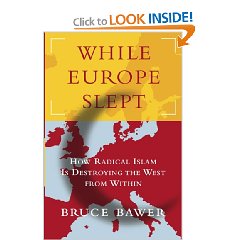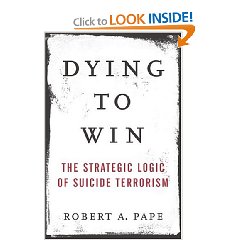The most frightening facts that the author brings forward, apart from the grotesque intolerance of many Muslims, is how they refuse to integrate. The author lays bare the false assumptions by government authorities who anticipated integration over several generations. In one case study, Turkish men imported not one but three wives over time, and have an average of 6.4 children with each wife. A small group of Turkish male guest workers numbering less than 150 thus grew to over 2,500 non-integrated and largely rabid Muslims prone to anti-democracy.
The author also addresses–as Steve Emerson addressed in his PBS film in 1994–how immans in Europe uphold the Muslim traditional of female mutilation, female slavery, and the Muslims being under NO OBLIGATION to accept the rules and conventions of the secular states where they are guests.
The author discusses how anti-semitism is on the rise across Europe, spurred by intolerant Muslims, and how the authorities tend to ignore the Muslim attacks on Jews, their honor killings and other travesties within their own communities.
The author goes further and notes how many of the children are “dumped” back home to be brain-washed in madrasses, and even if taught in-country, are taught intolerance.
On balance, despite the lack of footnotes, this is an extraordinary book, and it gives reasonable rise to the informed judgement that expulsion edits are required if individual countries are to protect themselves from both Muslim intolerance and the importation of poverty that accompanies illegal immigration.
Over-all the author provides a very broad look at how the Europeans have become lazy, are not re-populating, and are all too inclined to be anti-American as a mind-set, without recognition of all that America has contributed. European anti-Americanism, combined with European blind eye toward Muslim intolerance, is basically gutting Europe, to the point that one third of the Dutch plan to leave the Netherlands.
This excellent book has helped me see that there are two distinct views on the Muslim threat that have to be balanced. On the one hand, there is the liberal view that Bin Laden and Al Qaeda were a concocted threat nurtured by the US Government in order to provide an excuse for invading Central Asia and Iraq. On the other, there is the conservative view that Muslims who are intolerant and who refuse education, emancipation of their women, and integration into the host society, should be regarded as a clear and present threat to the society, and should be expelled. I believe that both views have credibility and both views need to be considered as we move forward.










